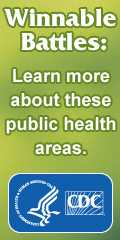May 2013
Did You Know? is a weekly feature from the Office for State, Tribal, Local and Territorial Support to inform your prevention activities. We invite you to read, share, and take action!
View the Current Did You Know?
May 31, 2013
- Hepatitis B affects 1 in 12 Asian Americans and Pacific Islanders.
- Two out of three Asian Americans with hepatitis B don’t know they are infected; you can send an eCard to alert people to the potential risk.
- CDC has a short, private, online Hepatitis Risk Assessment to help people find out whether they should be tested or vaccinated for viral hepatitis.
May 24, 2013
- Exposure to UV radiation, either from sunlight or indoor tanning devices, is the most important and avoidable risk factor for skin cancer.
- People who indoor tan before age 35 have a 75 percent greater risk of melanoma, which is the deadliest form of skin cancer.
- Serious skin infections can result from using an unclean tanning bed. You can promote the truth about tanning using this user-friendly infographic and web button.
May 17, 2013
- Public pools are frequently contaminated with feces. Swallowing pool water with feces in it can make people sick.
- Contrary to popular belief, chlorine does not kill germs instantly.
- Health promotion materials are available to educate the public on how to prevent recreational water illnesses.
May 10, 2013
- Hepatitis C can cause serious liver damage and even liver cancer, yet up to three in four people who have it don’t know they are infected.
- According to a new CDC report, baby boomers (adults born from 1945 through 1965) account for 67 percent of cases and 72 percent of deaths among people with hepatitis C.
- CDC offers hepatitis C testing guidance for clinicians to help them identify people with the condition and link them to lifesaving medical care; CDC also offers resources for the public.
May 3, 2013
- More than 75% of US adults with high blood pressure are taking medication to control it—reducing their risk for heart disease and stroke.
- When healthcare professionals and patients work as a team—such as engaging patients in their own care with self-management tools and coordinating care among team members (pharmacists, nurses, etc.)—blood pressure control improves.
- Million Hearts® tools can help healthcare professionals and patients reduce blood pressure and improve heart health.
Did You Know? information and web links are current as of their publication date. They may become outdated over time.
- Page last reviewed: November 9, 2015
- Page last updated: October 14, 2016
- Content source:



 ShareCompartir
ShareCompartir



